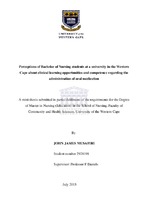Perceptions of Bachelor of Nursing students at a university in the Western Cape about clinical learning opportunities and competence regarding the administration of oral medication
Abstract
Medication errors can result in harm and death, for which nurses are legally liable. The administration of medication by nurses can be improved through education and training to avoid medication errors in future. The study aimed to investigate fourth year Bachelor of Nursing students’ perceptions regarding the clinical learning opportunities and their competence in the administration of oral medication in a general hospital. A quantitative cross-sectional descriptive design was employed. The all-inclusive sample constituted 176 fourth year Bachelor of Nursing students. A total of 125 respondents completed the self- report questionnaires. Descriptive statistics were produced through data processing and univariate and bivariate analysis using of SPSS version 22. The study’s findings show that most of the 125 respondents were placed in a medical (92%, 115) and surgical ward (86.4%, 108). However, a total of 59.2% (74) of the 125 respondents did not practice administration of oral medication on a daily basis. The majority of the respondents perceived themselves as competent in the administration of oral medication. However, only a total of 19.2% (24) of the 125 respondents perceived themselves as competent in all 42 skills required for the correct procedure of administration of oral medication. A negative correlation was found between total self-assessment of competence scores and total clinical placement scores. An observation study, using the check list, of the competence of nursing students in the administration of medication is recommended to exclude bias associated with self-assessment. The use of simulation is recommended to enhance the opportunities and competence of the students in the administration of oral medication to many patients.

